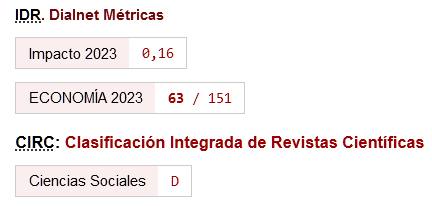"El Capital" de Thomas Piketty. ¿Retorno a los clásicos?
Palabras clave:
distribución de la renta y la riqueza, crecimiento económico, capitalismo, economía políticaResumen
En El Capital en el Siglo XXI (2014) Thomas Piketty trata de las leyes fundamentales que gobiernan históricamente la acumulación y la distribución de la riqueza en las economías capitalistas, partiendo de una sólida base empírica y combinando un análisis de los mecanismos de concentración de la riqueza hereditaria con una teoría del crecimiento y la distribución inspirada en el modelo de Solow (1956). Piketty entronca con la economía política clásica en la medida que vuelve a situar las cuestiones distributivas y la perspectiva histórica en el núcleo del análisis económico, exponiendo las asimetrías que pueden existir entre grupos sociales diferenciados por su función en el sistema económico. Pero se aleja de los economistas clásicos en algunas cuestiones fundamentales y, en particular, en cuanto que parte de una noción exógena del crecimiento que es la que determina, en última instancia, los patrones distributivos –cuando para los clásicos la causalidad opera en sentido inverso: es la distribución del producto, determinada social e institucionalmente en un contexto histórico concreto, la que condiciona el crecimiento.
Descargas
Citas
Acemoglu, Daron y James A. Robinson (2014): "The Rise and Fall of General Laws of Capitalism", http://economics.mit.edu. https://doi.org/10.3386/w20766
Aristis, Phillip y Malcolm Sawyer (2014): "A Reflection on Capital in the 21st Century", http://triplecrisis.com.
Bradford DeLong, John (2014): "Mr. Piketty and the 'neoclassicists': A Suggested Interpretation", http://equitablegrowth.org/blog.
Domar, Evsey (1946): "Capital expansion, rate of growth and employment", Econometrica, Nº 14, pp. 137-47. https://doi.org/10.2307/1905364
Galbraith, James (2014): "Kapital for the Twenty-First Century?", Dissent Nº 61(2), pp. 77-82, http://www.dissentmagazine.org. https://doi.org/10.1353/dss.2014.0032
Gates, Bill (2014): "Why Inequality Matters", http://www.gatesnotes.com.
Gintis, Herbert (2007): "Review of Paul Krugman's The Conscience of a Liberal", http://www.amazon.com.
Harrod, Roy (1939): "An Essay in Dynamic Theory", Economic Journal Nº 49(193), pp. 14-33.
https://doi.org/10.2307/2225181
Harvey, David (2014): "Afterthoughts on Piketty's Capital", http://davidharvey.org.
IGM Economics Experts Panel (2014): "Piketty on Inequality", http://www.igmchicago.org/igm-economic-experts-panel.
Jones, Charles I. (2014): "The Macroeconomics of Piketty", pendiente de publicación en Journal of Economic Perspectives, http://web.stanford.edu.
Kaldor, Nicholas (1956): "Alternative Theories of Distribution", The Review of Economic Studies, Nº 23, pp. 83-100. https://doi.org/10.2307/2296292
King, Mervyn (2014): "Review of Capital in the Twenty-First Century by Thomas Piketty", http://www.telegraph.co.uk.
Kotlikoff, Lawrence (2014): "Will the rich always get richer?", PBS NewsHour, http://www.pbs.org/newshour.
Krugman, Paul (2014): "Why We're in New Gilded Age", The New York Review of Books, edición del 7 de Mayo de 2014, http://www.nybooks.com.
Krusell, Per y Toni Smith (2014): "Is Piketty's 'Second Law of Capitalism' Fundamental?", artículo publicado en http://aida.wss.yale.edu.
Kuznets, Simon (1955): "Economic Growth and Income Inequality", American Economic Review Nº 45(I), pp. 1-28.
Mankiw, N. Gregory (2014): "How Inherited Wealth Helps the Economy", The New York Times, edición del 21 de junio de 2014, http://www.nytimes.com.
Metcalfe, J. Stanley (1998): Evolutionary Economics and Creative Destruction, Serie The Graz Schumpeter Lectures, Londres: Routledge. https://doi.org/10.4324/9780203275146
Milanovic, Branco (2014): "The Return of 'Patrimonial Capitalism': A Review of Thomas Piketty's Capital in the Twenty-First Century", Journal of Economic Literature Nº 52(2), pp. 519-534.
https://doi.org/10.1257/jel.52.2.519
Palley, Thomas E. (2014): "The Accidental Controversialist: Deeper Reflections on Thomas Piketty's Capital", http://www.tomaspalley.com.
Passinetti, Luigi (1962): "Income Distribution and Rate of Profit in Relation to the Rate of Economic Growth", Review of Economic Studies Nº 29, pp. 267-279. https://doi.org/10.2307/2296303
Piketty, Thomas (2014): Capital in the Twenty-First Century, Cambridge MA: The Belknap Press of Harvard University Press.
Piketty, Thomas y Emmanuel Saez (2012): "A Theory of Optimal Capital Taxation", Working Paper 17989, National Bureau of Economic Research, Cambridge MA. https://doi.org/10.3386/w17989
Piketty, Thomas y Gabriel Zucman (2014): "Capital is Back: Wealth-Income Ratios in Rich Countries 1700-2010", documento de trabajo pendiente de publicación en Quarterly Journal of Economics.
https://doi.org/10.1093/qje/qju018
Piketty, Thomas y Gabriel Zucman (2014): "Wealth and Inheritance in the Long-Run", documento de trabajo pendiente de publicación en Handbook of Income Distribution (North-Holland, volume 2). https://doi.org/10.1016/B978-0-444-59429-7.00016-9
Ray, Debraj (2014): "Nit-Piketty. A comment on Thomas Piketty's Capital in the Twenty-First Century", http://www.econ.my.edu.
Rognlie, Matt (2014): "A note on Piketty and diminishing returns to capital", http://www.mit.edu.
Rowthorn, Robert (2014): "A Note on Thomas Piketty's Capital in the Twenty-First Century", http://tcf.org. https://doi.org/10.1093/cje/beu031
Sala-i-Martin, Xavier (2014): "Piketty y 'Capital en el Siglo XXI", artículo disponible en http://salaimartin.com/randomthoughts.
Salvadori, Neri (editor) (2003): The Theory of Economic Growth. A 'Classical' Perspective, Cheltenham: Edward Elgar.
Solow, Robert (1956): "A Contribution to the Theory of Economic Growth", Quarterly Journal of Economics Nº 70, pp. 65-94. https://doi.org/10.2307/1884513
Solow, Robert (2014): "A review of Capital in the Twenty-First Century", http://www.newrepublic.com.
Stiglitz, Joseph E. (2014): "Democracy in the Twenty-First Century", http://www.project-syndicate.org.
Summers, Lawrence H. (2014): "The Inequality Puzzle", Democracy Journal Nº 33, Verano de 2014, http://www.democracyjournal.org.
Taylor, Lance (2014): "The Triumph of the Rentier? Thomas Piketty vs. Luigi Passinetti and John Maynard Keynes", documento de trabajo presentado en Structuralist Symposium on Thomas Piketty 'Capital in the Twenty-First Century, Schwartz Center for Economic Policy Analysis, The New School for Social Research, http://www.economicpolicyresearch.org.
https://doi.org/10.1080/08911916.2014.1002296
Wren-Lewis, Simon (2014a): "Capital in Piketty's capital", http://www.pieria.co.uk.
Descargas
Publicado
Cómo citar
Número
Sección
Licencia
Esta licencia permite a terceros compartir (copiar y redistribuir el material en cualquier medio o formato) y adaptar (remezclar, transformar y crear a partir del material para cualquier finalidad, incluso comercial), siempre que se reconozca la autoría y la primera publicación en esta revista (La Revista, DOI de la obra), se proporcione un enlace a la licencia y se indique si se han realizado cambios en la obra.







